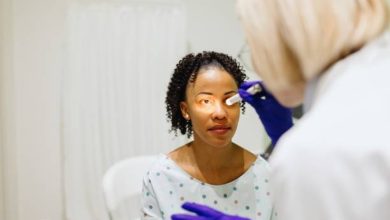5 Surgery Options for Black People with Advanced DME


If you didn’t know, Diabetic Macular Edema (DME) is a severe complication of diabetes. Thanks to DME, many people are at risk of blindness if they don’t treat it – and for Black folks, that risk is even higher. And for some people, if the treatments and lifestyle changes don’t work, surgery may be the only option.
In fact, in an advanced stage, surgical interventions may become necessary.
Here are five surgical options for anyone trying to manage late-stage DME.
1. Vitrectomy
This surgical procedure takes what is called vitreous gel (a jelly-like substance inside your eye) and replaces it with saline. People who undergo a vitrectomy usually need it due to bleeding in the areas known as the vitreous. Sometimes, individuals with scar tissue may also opt for a vitrectomy.
Fortunately, this procedure may help vision by removing the blood as well as pressure from the retina. As a result, the retina can reconnect to its proper place, actually returning vision. Overall, vitrectomy is a great intervention for people who want a chance at restored sight!
2. Laser Photocoagulation
Using a laser, photocoagulation actually causes tiny burns on your retina. Although this sounds painful, these burns are useful because they seal leaking blood vessels and even prevent abnormal blood vessels from causing DME.
Laser photocoagulation also brings down swelling in the center of your retina. This is critical because it can return sharp vision if done early enough. Thanks to the procedure, many folks can keep DME from causing blindness.
RELATED: Understanding the Types of Diabetic Macular Edema (DME)
3. Grid Laser Therapy
A form of laser photocoagulation, grid laser therapy targets the macula, the center of your retina, to fix major areas of leakage. It actually does this all at once, making it a very efficient way to keep swelling down and get your vision back to a healthy state.
If you suffer from ‘diffuse DME,’ grid laser therapy may be the best option. Because diffuse DME often hits in the later stages, this procedure is recommended for individuals who have exhausted other options.
4. Corticosteroid Implants
While the thought of implants in your eye may not be appealing, corticosteroid implants are very minimally invasive. What they do is simple. They release corticosteroid meds over time, allowing them to lower inflammation and keep swelling in check.
Do other treatments not work for you? Do you want a lasting solution to your swelling? Do you want to preserve your vision at all costs while not resorting to invasive surgery? Then implants may be your best choice.
5. Anti-VEGF Therapy
First off, what is VEGF, you might ask? If you’re not familiar, vascular endothelial growth factor (VEGF) therapy uses injectables to weaken the effects of VEGF. Basically, VEGF is a protein that causes abnormal blood vessels to grow in the retina.
When used effectively, these injections bring down abnormal blood vessel growth, thereby preventing excessive leakage.
The good news is, that this anti-VEGF therapy may significantly help with vision in patients with advanced DME. This is excellent news for Black patients who face more aggressive forms of DME and often experience worse outcomes.
RELATED: 7 Signs Of DME And What To Do About It
Piecing It All Together
Advanced DME doesn’t have to change your life for the worse. Whether you’re still in its early stages and making lifestyle changes, or you’re facing serious complications, you always have options. Of course, the first thing you should do is make informed decisions.
By speaking with an ophthalmologist, you can find the best course of action for you. Everybody is different. Some people will need to opt for the more invasive treatment, while others may take a lesser, more streamlined approach to DME.
Whether it’s implants, fluid replacement, injectables, or something else, the five main procedures for DME can be life-changers. Given the increased risk factors and complications in the Black community, speaking with your doctor promptly and openly is highly recommended.
Before you know it, you’ll be seeing everything you’ve been missing!




